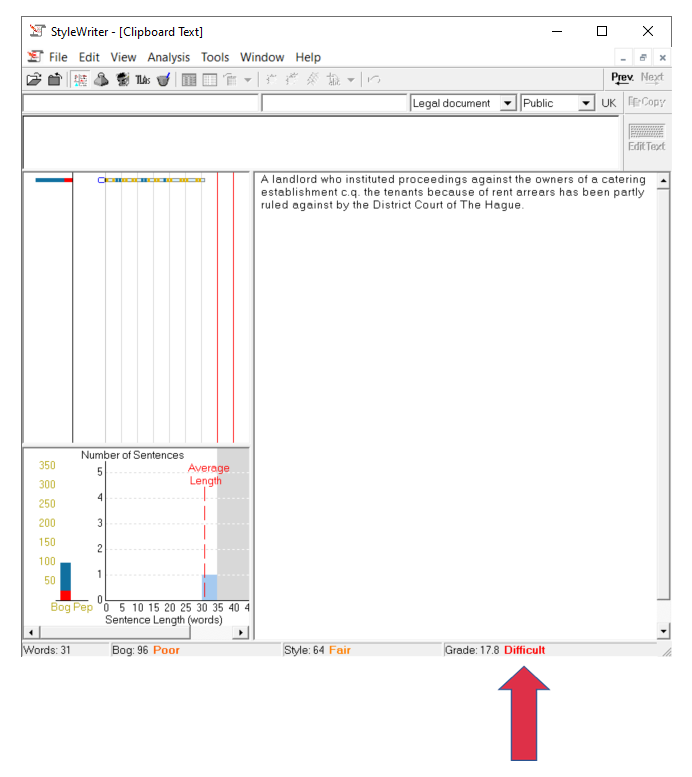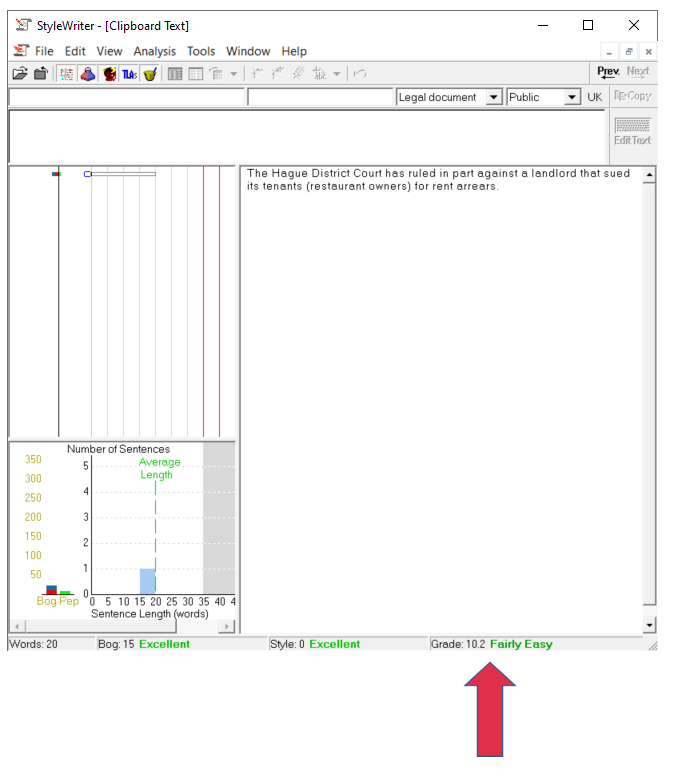Over the years, legal blogs have become a natural part of legal communication, reporting, and marketing for lawyers and related professions like notaries and judicial officers. So much so, they even have a nickname: ‘blawgs’!
Legal blogging occurs the world over and in many languages. It’s integral to democratising access to the law. Translating your blog posts into English can be a vital part of this and beneficial to the success of your legal practice.
Why law firms blog
Research by Clio shows that over a third of clients find law firms through online searches. Attorney Ruth Carter says that around half of her clients find her through her legal blog. Legal blogging helps firms build a relationship with potential clients long before their first face-to-face meeting. Blogs are educational and help create a sense of trust and authority; trust that you know your stuff and authority that you’re the ‘go-to’ lawyer in your field.
The importance of translating blogs into English
There are obvious reasons why it helps to blog in English alongside your native language. First, it opens up the pool of potential clients who will come across your blog and find it reflects European society’s cosmopolitan nature.
I’m not suggesting you give up blogging in your first language. After all, local searches help attract clients to your firm, and much of your audience will share that language.
But English translations of your legal blog posts will create new client opportunities and help attract local English press or other significant players in your legal area. They also help improve your search engine optimisation or SEO. In simple terms, SEO is the process that increases your website’s visibility when potential clients search for relevant topics online.
English language content
According to Statista, 70% of people in the Netherlands and 64% in Belgium have some command of English. Across Europe as a whole, just over half of all people have conversational English abilities, according to a 2006 study by the European Commission.
The more content you have in general, the more likely you are to grow your traffic, and your content could easily ‘go viral’ outside your home country because of the ubiquity of the English language. But don’t reach for machine translation just yet.
The pitfalls of Google Translate and DeepL
The internet has done a lot to democratise access to information, as have translations. That said, there’s a big difference between running text through machine translation software like Google Translate – or even fancy newer tech like DeepL with its ‘convolution neural networks’ – and hiring a professional translator.
Digital translators can be great for getting the gist of what a foreign language text says; hundreds of millions of people translate 100 billion words per day using Google Translate alone. But when they do that, they know they are not reading the source text and won’t interpret a clunky (and often baffling) reading experience as a failure of the original author.
This is not the case when someone reads a blog post on your website written in English. Because visitors to your website will see the quality of English there as representative of your language skills and probable level of service. If they have an unsatisfying reading experience, they will view that as your failure and your failure alone.
Use plain English for your legal blog
Law firms should use engaging and straightforward English for their blogs, especially given the target audience – existing and potential clients – and the complexity of the law. But, unfortunately, few people can write with the clarity and nuance needed in this highly competitive industry. And machines certainly can’t.
Earlier this year, I came across a law firm’s English blog and found the writing clunky. I suspected they’d used machine translation, so I took the Dutch version and ran the first sentence through DeepL for comparison. Barring one word, it was a match. I edited the DeepL translation into plain English. Here’s the comparison:
| DEEPL TRANSLATION | PLAIN-ENGLISH EDIT |
| A landlord who instituted proceedings against the owners of a catering establishment c.q. the tenants because of rent arrears has been partly ruled against by the District Court of The Hague. (31 words) | The Hague District Court has ruled in part against a landlord that sued its tenants (restaurant owners) for rent arrears. (20 words) |
I then ran the DeepL translation and my plain-English edit through StyleWriter, software that helps analyse the readability of text.
As you can see below, StyleWriter ranks the DeepL machine translation as ‘difficult’, and my plain-language edit as ‘fairly easy’ to read. Data doesn’t lie.
DEEPL TRANSLATION

PLAIN-ENGLISH EDIT

You don’t need software to tell you that the DeepL version is the harder read. But DeepL also created ambiguity here, among other issues.
I found room for seven improvements in just 31 words
- Improve readability by using the active voice. I made the court the subject of the sentence. For more tips on how to do this, visit https://dottedandcrossed.eu/active-voice/.
- Use shorter sentences. Readers have limited attention spans, so get straight to the point. The plain-English version is 20 words – 35% more concise than the DeepL translation (31 words).
- Use strong verbs – the plain-English translation uses ‘sue’ instead of ‘institute proceedings against’.
- Avoid Latinisms. The DeepL version leaves the Latin c.q. (caso quo) in the text. Dutch lawyers use – and sometimes overuse – c.q. to mean ‘or’, ‘and/or’, or ‘as the case may be’, but c.q. means nothing to most English readers.
- Eliminate ambiguity. Even if an English reader understands Latin, the DeepL version leaves us wondering whether the tenants and restaurant owners are the same party. Even though c.q. intends to expand on the preceding term here, it doesn’t work mid-sentence and makes them sound like alternatives instead. I resolved this by putting the description of the tenants in brackets.
- Consider your reader. DeepL used the broad term ‘catering establishment’ for horecazaak. While the translation isn’t incorrect, a quick look at the case confirms the establishment is a restaurant – ECLI:NL:RBDHA:2021:461, Rechtbank Den Haag, 8616735 / 20-11418 (rechtspraak.nl). In an informative text like a blog, be specific and hold the reader’s attention with something they can visualise.
- Last, cut the word ‘of’ in English when appropriate. For example, use ‘The Hague District Court’, not the ‘District Court of The Hague’.
How plain language helps with SEO
Translating your legal blog into plain English is essential not only to attract and build client confidence in your services but also because of the related SEO benefits.
Over the years, search engines like Google have become better and better at picking up the language patterns of users’ search queries and delivering content to them that fits these terms. To quote the Center for Plain Language:
“You’re more likely to search for ‘Do I have poison ivy?’ than ‘Have I suffered exposure to toxicodendron radicans?’”
The same goes for legal search queries. If you use plain legal language in your blog, it’s much more likely that Google, or a search engine like it, will pick up on that language and deliver it to its user. Remember, many potential clients don’t know legal jargon, so they won’t search for it. Using plain English means more web traffic for you. But getting web traffic is just the beginning; if users don’t have a quick, easy experience reading your content, they aren’t likely to engage your services.
Why you should hire a professional into-English translator
I’ve blogged previously about why you should hire a specialist legal translator. Your blog deserves no less – it’s your law firm’s shop window, the first place many prospective clients will visit and form an opinion of you.
Whether those prospective clients are native English speakers or other foreign-language speakers with whom you’ll use English as a bridging language, the English needs to be clear, concise, and compelling. English that attracts new clients, not puts them off.
Blog translation service
Blogging takes time and it’s all non-billable hours. Assuming you want a return on that time investment, entrust the translation to a professional – a translator specialised in plain legal English – not a machine that churns out unappealing content that no one reads.
I offer law firms an English blog translation service based on a subscription model that works out cheaper than my rate for legal documents. Why? Because the more effective your English blog is, the more English-speaking clients you’ll attract, and the more English translations you’ll require down the line. So I’m happy to share some of the marketing costs upfront.
You might not want to translate all your blog posts into English, so select articles likely to have widespread appeal and translate those.
Alternatively, why not free up even more of your time? Let me write some English blog posts for you. I work with a native Dutch colleague whose translations are a joy to read if you also want your blog posts translating into Dutch.
To harness the SEO and marketing benefits of English blog writing and translation, get in touch today to discover more.

